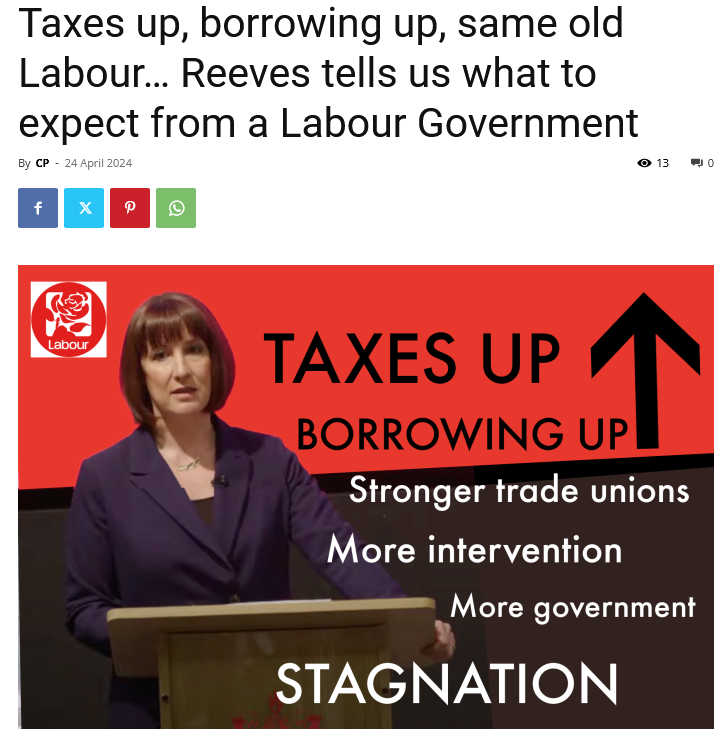You can download here the rough, first-draft version of my analysis of the 2024 Mais Lecture given by Rachel Reeves, the Shadow Chancellor of the Exchequer.
This summary has just been published by the Conservative Post website so I have decided to make available the current, not-totally-polished version of the full paper behind it.
In her lecture the Shadow Chancellor revealed in coded form how Labour will run the economy once in power – and they, not businesses or private individuals, will be at the helm of the economy, with the speaker herself as the Great Helmsperson.
The lecture was a depressing contribution from an intellectual lightweight. Faux gravitas was added by the quotation of many obscure sources. There were endless tributes to the sagacity of her alma mater – the Bank of England – and other elements in the authority-financial complex such as the Office for Budget Responsibility. Words like ‘stability’, ‘investment’, ‘growth’, and ‘security’ were used repeatedly, as if by her saying them they automatically result from the enactment of her policies.
The lecture was reactionary in drawing inspiration from the supposed successes of New Labour and – without naming it – Private Finance Initiative (PFI). The speaker repeatedly used the word ‘decade’ for the lifespan of New Labour’s successes and advisedly: the decade of false success lasted from their election in May 1997 until September 2007, when their posterchild Northern Rock had to seek support from the Bank of England.
New Labour were completely blameless, according to the speaker, for that, for the crash of several other lenders in Labour areas (Bradford&Bingley, HBOS, Alliance&Leicester), and for the rest of the Global Financial Crisis.
The lecture is sycophantic towards our many wonderful UK ‘institutions’. We will get many more such quangos, into which will be vested control over economic life, with the Great Helmsperson pulling the strings. Control will move away from suppliers and buyers. Sound like Communist China or the Soviet Union?
This extension of ‘institutions’ and quangos will provide many more seats for the centre-Left nomenklatura, who already dominate national life, enjoying power without accountability to the public.
Labour will cosy up to the EU, and would dearly love to rejoin it. In the meantime they will merely ape it, reproducing for the UK a series of replicas of EU ‘institutions’.
Somehow the national budget will come into in balance on the day-to-day costs, even though Labour will immediately boost resources for the NHS – that can only mean tax rises as extra borrowing to meet day-to-day costs is ruled out. That does not mean no extra borrowing: borrowing for public ‘investments’ will be conducted in a separate budget. To keep the borrowing optically off the national debt, it will be contracted inside schemes like The European Fund for Strategic Investments, which is a re-heating of the PFI model so much used by New Labour to make new schools and hospitals pop up. Now it will produce new power stations and toll roads too.
These ‘strategic investments’ are needed to meet Net Zero targets, Net Zero being a major money earner: the environment will be protected, except that planning laws will be relaxed to build many more new homes.
Private pension money will be mobilised as a source of borrowing into the new version of PFI, because savers deserve better returns and because this type of capital is ‘patient’: it does not seek quick returns.
The Mais Lecture has at least delivered clarity in one sense about Labour’s plans for the economy: they are a stream of incoherent nonsense that promise only more borrowing – with borrowing for ‘investment’ once again concealed within PFI, but now with private pension plans being coerced into lending into PFI. The costs of any services subject to this PFI Mark 2 will go up, just as they did (and continue to do) under PFI Mark 1.
Taxes can only go up, to keep the day-to-day costs budget in balance as Labour spends more on the NHS and on the process of government, with its expansion of intervention and quangos. Taxes up, borrowing up – same old..
The Mais Lecture promises more government, more intervention, stronger trades unions and a form of economic stability that the speaker calls ‘Securonomics’ – let’s call it stagnation. If people want to know what it looks like, they should study the period 1964-79 when, with a brief centrist interregnum under Edwards Heath from 1970-4 (much interrupted by strike action), Labour was ‘the natural party of government’. Indeed, if you want risk-free stagnation, vote Labour. It is the safe and secure choice. It contains no risk at all because the outcome is completely certain: it’s disaster.

